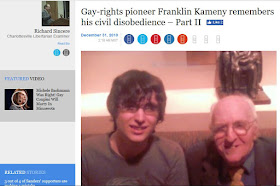Gay-rights pioneer Franklin Kameny remembers his civil disobedience – Part II
December 31, 2010 2:18 AM MST
World War II veteran and gay-rights activist Franklin Kameny has been involved in civil liberties protests for almost 50 years, since shortly after he was fired by the federal government for being gay.
In an exclusive interview with the Charlottesville Libertarian Examiner last May at the National Press Club in Washington, Kameny remembered several occasions when exercising his First Amendment rights to assembly and expression led to his arrest. Three of them are recounted here.
Supreme Court steps
One memorable moment was on the steps of the U.S. Supreme Court in 1987, during that year’s gay-rights March on Washington, which, Kameny noted, “relevantly occurred one year after the Supreme Court’s decision in Bowers v. Hardwick on the Georgia sodomy law, the one that was finally overturned in 2003 by Lawrence v. Texas.”
He was part of “a sizable sub-demonstration at the steps of the Supreme Court and in those days that whole plaza in front was not open to the public. In fact, they had just opened that section of First Street to the public.
“A number of people, individually and in groups, wanted to protest vigorously on the plaza. There was a police barricade right at the top of the lower level of steps.”
The police, he said, were well-organized and, after a fashion, assisted in the protest.
“They would allow a group of protesters in and onto the plaza and then let us be there for a while and then order us away. If we didn’t go away, then they arrested us.”
Kameny’s “little group didn’t go away, so they lowered us into a paddy wagon and I spent much of the rest of the day” at the police precinct on Fourth Street and Indiana Avenue in Judiciary Square, where his arrest was processed.
He recalled that “Hardwick himself was there and I ended up paying a fine. I remember it vaguely as $50 dollars by pleading guilty and that ended that particular arrest sequence.”
D.C. City Council
He pointed out “a few other civil liberties type occasions,” including one in Philadelphia in the 1970s and specifically remembering one in 1991 or 1992, when the chair of the D.C. “City Council Judiciary Committee would not process the bill to repeal the sodomy law and eight of us had a sit-in in her office”
The eight, he said, “were arrested and I spent the rest of the day in a lock-up at the main police headquarters,” leaving late at night, paying a fine, “and that was that.”
The story does not end there:
“We got the law passed in ’93. I wrote the section of the repeal, actually, and that ended that.”
South African Embassy
A third incident that Kameny remembers did not involve a gay-rights issue.
“One time,” he said, “then-Delegate [Walter] Fauntroy and I and some others -- on not a gay issue at all -- picketed the South African Embassy.”
The time was the mid-1980s, probably 1986, when there were a series of protests against the apartheid regime then governing South Africa. A number of celebrities – actors, musicians, poets, and politicians – offered themselves up to be arrested every day for the better part of a year.
“Nowadays, on First Amendment grounds, it’s possible to picket embassies,” Kameny noted. “In those days, it was not.”
Kameny remembers the embassy demonstration resulting in his arrest, but it was something of a formality: “I don’t think I spent any time in jail.”
A bit of historical irony is wrapped up in that last memory, since South Africa's constitution guarantees equal rights for its gay and lesbian citizens, and it is the only African country that permits same-sex couples to wed.
With regard to his numerous arrests, Kameny smiled, “I consider them all honorable.”
Publisher's note: This article is drawn from my Examiner.com archives. It was originally published on Examiner.com on December 31, 2010. The Examiner.com publishing platform was discontinued July 1, 2016, and its web site went dark on or about July 10, 2016. I am republishing this piece in an effort to preserve it and all my other contributions to Examiner.com since April 6, 2010. It is reposted here without most of the internal links that were in the original.

No comments:
Post a Comment